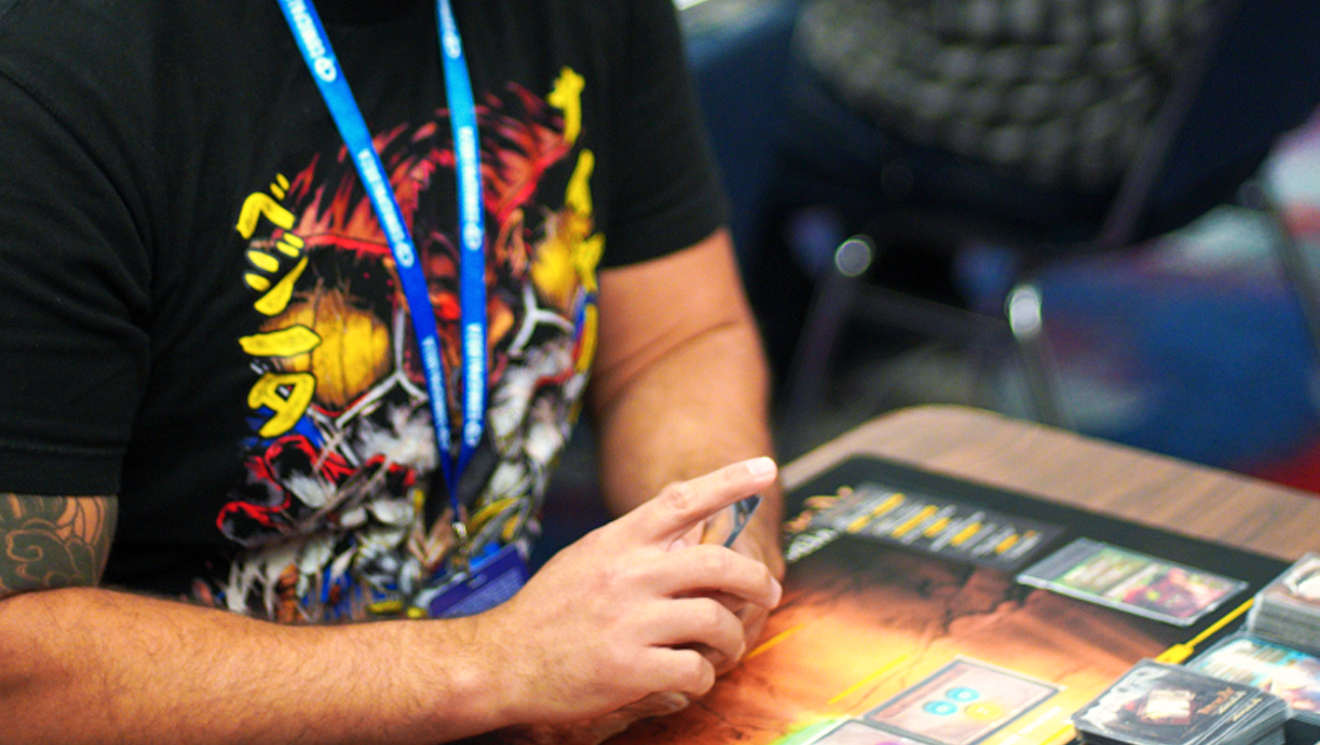Independent Tabletop Game Makers Brace for Trump Tariff Price Increases

The tariff policy by President Donald Trump is putting independent tabletop gamer companies in Texas in a difficult position: raise prices or lose customers.
Houston’s Danny Ayoub of Mega Moth Studios has a very simple dream: to produce a more affordable and accessible version of Magic: The Gathering. The collectible card battle game is fantastically popular, but also fantastically expensive. A single commander deck for the latest set, Edge of Eternities, runs between $42 and $59, and you need two if you and a partner are just starting out. Add in the cost of booster packs to augment your deck ($13 each) and Magic becomes a very costly hobby.
By contrast, X: Seekers of Fortune will come with three decks. Ayoub wanted to combine his love of Magic’s artwork, mechanics, and lore with the simplicity of playing gin rummy with his parents growing up. All the extras of Magic are there, such as deep mechanics, keywords, and fantasy characters, but self-contained rather than sprawling.
“I played Magic: The Gathering for 20 years, and it just became difficult to keep up with economically and in terms of time,” Ayoub said in a phone interview. “I loved playing but never felt like I could get family and friends into it because of those hurdles.”
Ayoub and his co-creator, Woodlands-based Joel Watts, designed X and launched a successful Kickstarter campaign to develop the game. Crowdfunding is the heart of the indie tabletop gaming world. Kickstarter reports that in 2024, $270 million in backing capital went to gaming projects, and 83 percent of that specifically went to tabletop games.
Mega Moth Studios more than doubled its goal when the campaign ended in June 2024. Then, Trump won re-election, partially on his promise to institute sweeping tariffs against imports as a form of economic warfare. In April, Trump announced massive tariffs, particularly against Asian countries like China.
China is where boxes of X are sitting, waiting to be delivered to backers. The tariff rate from China is currently 34 percent, though Trump has threatened as high as 200 percent. Between the price hike and the instability, Mega Moth has been struggling to get its game stateside.
“It’s going to increase the cost substantially,” said Ayoub. “When you add cost that does nothing for the consumer, that’s rough. We had this ambition to make the game extremely inexpensive compared to Magic, $35 as opposed to, say, $65. We’re going to have to charge at least $40. That came late in the project. Up to the election, this wasn’t being factored in.”
The game’s backers have been very understanding, Ayoub said. They’re willing to pay the extra amount, but he worries about X’s market viability once it’s widely available. The whole selling point of X is that it’s less of an investment than Magic. Take that away, and it has far less chance of success.
“When you look at people tightening their belts because of the tariffs, toys and game are the first thing to go,” said Ayoub. “There’s no way for us to project how much this game is going to cost us to bring into the state. As new entrepreneurs launching the American dream, it felt like the people who run the system decided to make it impossible for people to live that dream.”
Why Domestic Manufacturing Isn’t the Answer
The stated purpose of the tariffs is to force American companies to do more manufacturing at home. For small, independent companies making new games, that’s not economically feasible.
Mathue Ryann is the founder of Envy Born, a maker of small tabletop games in Fort Worth. They specialize in travel-size games like Hercules and the 12 Labors and Sirens. Most of their products cost just $14.99, perfect for a family on vacation looking for a new game.
Like Mega Moth, Envy Born uses the crowdfunding model to generate initial buzz and a fanbase, then sells the products once a market hold is established. Also, like Mega Moth, Ryann had to tell backers on Hercules there would be a tariff fee to account for the price hike caused by the Trump Administration.
“No one is happy, but they understand,” said Ryann in a phone interview. “I haven’t increased the price for stuff in stock, but I’m getting low on some of them. When I import them again, I might have to revisit the price. If I go outside a certain price point, they lose their value.”
It seems like the easiest way to avoid the price hike would be to use domestic game-making services. There are a few companies available, such as Delano in Battle Creek, Michigan; Cartamundi in Dallas; and Shuffled Ink in Orlando, Florida. Between these three companies, a game maker can get boxes, books, cards, and more.
Just not at a price that the market will handle. Ayoub said that the lowest price he could get for a 2,000 unit run of X would result in an MSRP of $88 to make a profit, making it almost as expensive as Magic. Ryann also said that he explored domestic manufacturing, but every quote would have priced him above $15 a game. Some components couldn’t even be made stateside.
“The manufacturing infrastructure for board games just doesn’t exist in the U.S.,” said Ryann. “There are some that can do just cards and paper, but miniatures and dice? That just doesn’t exist. I know some manufacturers are trying to move to America, but even then, they’ll just be importing materials from China. The stuff you make stateside is way more expensive.”
Ayoub’s day job is as a supply chain expert in one of the largest supply chain companies in the country. He says that many Americans simply don’t understand that manufacturing can’t just turn on a dime. When he and Watts started Mega Moth, the goal was to use domestic manufacturing specifically because Ayoub spends his days negotiating the headaches of international trade.
He quickly ran into problems. According to him, American manufacturing is badly behind. Not only do we have fewer facilities, the ones we have are less efficient and technologically advanced. This is another reason that the price per unit skyrockets when trying to make things at home.
“If America was truly competitive, why make it anywhere else?” he said. “People think we’re just trying to save a few pennies while exploiting workers. That’s not true in our industry. China has very twenty-first century facilities. That’s just not available in the U.S. The U.S. has had 30-plus years of decoupling the consumer from manufacturing. We can’t make what we want at home, and American wages haven’t kept up to be able to afford it.”
What Happens Now?
The giants of the industry like Wizards of the Coast and Hasbro will likely be fine. Ordering millions of units and having market domination means they can raise prices less and hold onto space on store shelves. If the Trump tariffs continue, they may be able to afford rebuilding (or in some cases just building) the domestic manufacturing sector for games.
However, independent game makers don’t have these resources. They are fans of the hobby with an idea largely funding their dream through other fans and word of mouth. Even a small increase in manufacturing or import costs can derail these entrepreneurs before they even get off the ground.
An industry implosion hasn’t happened in the indie scene yet thanks to a few factors. The mercurial nature of the tariffs changes rates monthly. Kickstarter backers currently seem willing to foot the extra cost, and companies are still stocked with games they bought at pre-tariffs rates.
Ryann says he’s seen a few independent game makers go out of business. He doesn’t think it’s the tariffs’ fault yet, but he’s braced for when the bill comes due.
“Some of the companies were using the tariffs as an excuse, and this was just the final coffin, but it is a legitimate concern,” he said. “The prices are just going to go up for most things. I wish there was a threshold or some kind of exemption for small business under a certain gross like in Europe.”

Reign Bowers is an outdoor enthusiast, adventure seeker, and storyteller passionate about exploring nature’s wonders. As the creator of SuperheroineLinks.com, Reign shares inspiring stories, practical tips, and expert insights to empower others—especially women—to embrace the great outdoors with confidence.




Post Comment